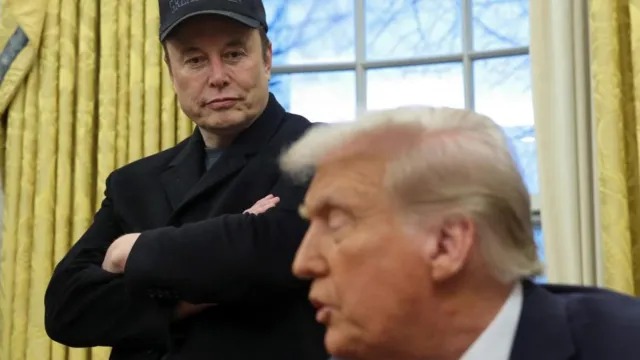
Musk Denies ‘Hostile Takeover’ of Government in White House Debut
Elon Musk has denied claims that he is leading a “hostile takeover” of the US government after being tasked with reducing federal spending. The billionaire entrepreneur made a surprise appearance at the White House, standing next to President Donald Trump.
Trump signed an order granting Musk’s Department of Government Efficiency (Doge) authority to cut the federal workforce. Critics, particularly Democrats, argue the agency lacks transparency and is facing legal challenges. Read more.
Musk’s Vision for Government Reform
Musk defended his aggressive cost-cutting plans, calling them “common sense measures.” He stated that reducing government expenses is essential to maintaining America’s financial stability. Critics, however, see the move as a power grab.
“The people voted for major government reform, and that’s what they’re going to get,” Musk said.
He also dismissed concerns about his unelected role, describing federal workers as an “unconstitutional fourth branch of government.” His efforts to shrink government agencies include freezing federal hiring and offering voluntary exits for workers.
Opposition and Legal Hurdles
Opponents argue that Doge’s restructuring could have severe domestic and international consequences. Senate Minority Leader Chuck Schumer criticized the plan as an “unelected shadow government conducting a hostile takeover.”
Legal battles have already delayed Musk’s initiatives, including an employee buyout program. Trump expressed frustration with the court system but remained confident that his administration would push through these reforms.
Public Opinion on Musk’s Role
A CBS News poll revealed that most Americans support Musk’s cost-cutting measures but disagree on his level of influence. Republicans largely back his efforts, while Democrats raise concerns over transparency and potential conflicts of interest.
Meanwhile, internal critics point to the effects on agencies like USAID, where funding cuts threaten global aid programs. Recently, the agency’s inspector general was dismissed after criticizing Musk’s cost-reduction strategy.
The Road Ahead for Musk and Trump
Trump’s executive order mandates significant reductions in federal staffing, requiring agencies to hire no more than one employee for every four departures.
Musk acknowledged that mistakes might occur along the way:
“Some things I say will be incorrect and should be corrected.”
As the restructuring unfolds, Musk and Trump continue to face resistance from political opponents and federal workers. With lawsuits mounting and agencies in flux, the future of the federal workforce remains uncertain.
For more updates on policy changes and economic reforms, visit Kenkou Land.





